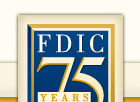Remarks by FDIC Chairman Sheila C. Bair
at the 75th
Anniversary "Face Your Finances" Road Show Event
Dallas, TX - September 10, 2008
Before getting started, I want to recognize our local FDIC community affairs staff. They're our boots on the ground here in Dallas. You've been very involved in planning today's program. I thank you all for your hard work.
I'd also like to thank our people in Dallas who rose to the challenge of taking over IndyMac bank in July. It was one of the biggest bank failures in U.S. history. Our team of 300 (mostly from Dallas) got the job done over the weekend, and reopened for business on Monday morning. We faced a lot of challenges that weekend, given IndyMac's size and complexity. But we kept our promise to the public. Bank customers had uninterrupted access to their insured deposits. My hat goes off to all of you who stepped up to the plate.
We meet at a very critical time for the American economy. There's a lot of uncertainty out there. People are worried about their jobs and paying their bills. Higher prices for food and gasoline are making it harder for families to make ends meet. Many are worried about keeping their homes. The housing slump remains the biggest threat to the economy, and the focus of policy makers.
The latest move came on Sunday, when the government took control of Fannie Mae and Freddie Mac. This action by the U.S. Treasury and the Federal Housing Finance Agency was needed. The clarity and certainty it will provide to the status of these two mortgage finance companies should have a stabilizing affect on the credit markets, housing, and the mortgage industry in particular.
As for the overall banking system, it remains sound. 98% of banks remain well-capitalized, and account for 99% of total bank assets. And I believe that the government's action with respect to Fannie and Freddie, will ultimately benefit the banking industry … particularly small institutions. It provides liquidity to the mortgage market, increasing the availability of funding for these banks to lend in their communities.
Bank failures & lessons learned
That being said, a number of banks in addition to IndyMac have failed this year. To date, eleven banks have failed, and more are expected. We have the resources to protect insured depositors. But we're constantly striving to improve the process, and to make it as seamless and painless as possible.
Closing a bank is not an easy task. It can be a very complex business. There are lessons to be learned. We've discovered, for example, that the public needs to re-learn how deposit insurance works.
We try to keep it simple. But bank failures are a reminder to us all -- young or old; rich or not so rich -- that every consumer needs to know their limits, and to fully understand their rights. People also need the where-with-all to make good decisions about money … how to spend it, save it, and invest it. They need to know how to access safe, traditional banking services. They need to know which bank accounts suit their needs … how to avoid high fees … and how to put money away to buy a home and to build wealth.
Consumers are thirsty for knowledge. Worried bank customers often call us first with their questions. Calls to our consumer hotline are double from a year ago. Many people are asking whether their money is protected by deposit insurance or if their bank is safe. And it's our job to give clear and immediate answers.
75 years of success
This year is the FDIC's 75th anniversary. We've been protecting people's money since the Great Depression. And as we've seen with the recent bank failures, because of what we do, not a single penny of insured deposits has been lost during those 75 years.
We're the oldest and largest deposit insurer in the world. Our system works so well that today 100 nations follow our example with some form of deposit insurance. As the saying goes: imitation is the greatest form of flattery.
We thought that our 75th birthday would be a great opportunity to reacquaint the American people with the virtues of deposit insurance. Our message is "confidence and stability." You can be confident that your money is safe and our banking system stable because insured deposits are backed by the full faith and credit of the United States.
One of the ways that we're getting the word out is by holding a series of town-hall style meetings throughout the country. We've held meetings so far in Chicago and San Francisco. The turnout was excellent, like it is here today in Dallas. Our largest regional office is in Dallas. And it's no wonder. This is a Mecca for business and finance throughout the Southwest, and one of the fastest growing cities in America. And the Lone Star State shines brightly as one of the best places to find a job. So I expect to walk away from here today with a bundle of new insights and innovative ideas for educating the public about money and banking.
Key questions
We'll be asking you to consider a couple of key questions during today's discussion.
They include: What are the obstacles to opening a bank account? Which kinds of bank accounts can best maximize wealth accumulation? What forms of financial education will help people make good decisions about taking out a mortgage, or saving for retirement? What are bankers saying about the biggest roadblocks that consumers face in building assets and tapping mainstream banking?
We also want you to think about solutions to the problems. And think in terms not only for Dallas, but also for the rest of the country.
75th Anniversary campaign
Before we get to the discussion, I want to explain a little more about how and why we're marking the FDIC's 75th anniversary. We've set up a series of national news events and projects. All are aimed at protecting our economic democracy for the next 75 years.
We're very proud of our history and what we've achieved. We've built confidence and stability into the American economy. We've kept the banking system safe and reliable through regulation. And when things get tough, we provide a safety net for the average American in the form of deposit insurance.
Everyone who walks into a bank that displays a "MEMBER-FDIC" sign knows that their money is in the safest place on the planet. That includes checking accounts, savings accounts, CDs or individual retirement accounts.
On June 16, 2008 we launched a national campaign to raise public awareness about deposit insurance and how it protects your money. (We picked June 16 because it was 75 years to the day that President Roosevelt signed the law that created the FDIC.)
The campaign includes advertisements in major newspapers, magazines, lifestyle publications and on the internet. The ads are designed to help explain how basic deposit insurance works … what the limits are, and where consumers can get additional information.
New PSAs
We're also launching a series of short, public service announcements this fall. They'll include both TV and radio spots. We're very excited about these spots. They're catchy and to the point. And they come at a critical time.
I hope everyone here today will visit our new 75th Anniversary web site to get all the details. There're a lot of new things to check out. For consumers, there's a new, easy-to-understand, one-page rundown on how deposit insurance works, and what the limits are. This is a work in progress, so we'd like any comments you might have.
There's also a new consumer education awards program for the very best new ideas in financial literacy. If you have a great idea, or know someone who does, I urge you to enter the contest. We're looking to recognize new ways to reach consumers. Nominations are being accepted through the end of October. Winners will be announced at a program in Washington, D.C. later this year.
Already we're seeing some impact from our efforts. In recent weeks, literally hundreds of news stories and personal finance columns about deposit insurance have blazed across virtually every type of modern media, newspapers, TV and radio shows, YouTube, and even blogs and chat rooms. And with your help, I know we can get even more traction and more attention in the weeks ahead.
Now, let's get started with the panel discussion.
We're privileged to have a very talented panel, with vast experience in banking and personal finance. I'd like to take a moment to introduce each of the panelists. As I do so please join me on stage.
- Pamela Yip is the personal finance reporter and columnist for the Dallas Morning News. She writes the paper's weekly personal finance lead feature, and the "Money Talk" column.
- Ann Baddour is a senior policy analyst at Texas Appleseed. She is the director of a national project promoting access to fairly-priced financial services for low-income immigrant communities. She's written numerous articles and publications during her 10 years in the field.
- Cecila Joseph is the director of operations for the Children's Defense Fund. She handles outreach to low and moderate income families, and helps families with disabilities take advantage of the Earned Income Tax, and Child Tax Credits. She works with the IRS and the Houston Asset Building Coalition in her outreach efforts.
- Stephan Fairfield is founder and CEO of Covenant Community Capital in Houston. This year, Community Capital will help 240 low-income families with financial literacy, education, business enterprise, and home ownership.
- Elizabeth Colvin is currently serving a three-year term as a member of the Taxpayer Advocacy Panel (TAP). "TAP" members volunteer up to 500 hours a year helping the IRS find ways to improve customer service and satisfaction.
Let's welcome them all with a very warm round of applause.

Chicago
July 16, 2008
San Francisco
July 22, 2008
Dallas
September 10, 2008
New York City
September 19, 2008
Kansas City
April 7, 2009
